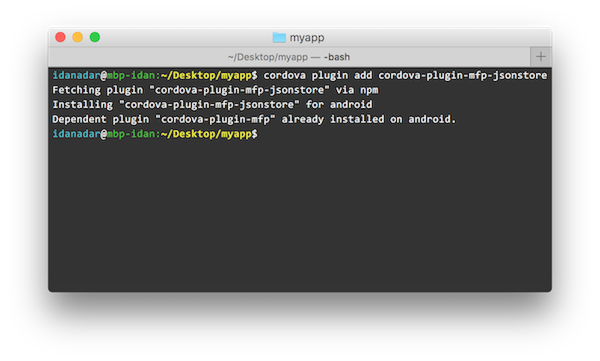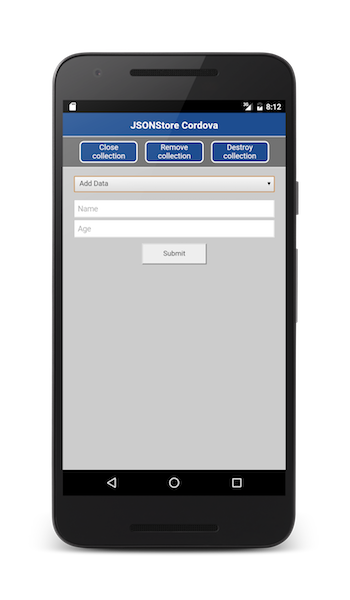Cordova アプリケーションでの JSONStore
improve this page | report issue前提条件
- JSONStore 親チュートリアルを読む。
- MobileFirst Cordova SDK が プロジェクトに追加されていることを確認する。 『Cordova アプリケーションへの Mobile Foundation SDK の追加』チュートリアルに従ってください。
ジャンプ先:
JSONStore の追加
Cordova アプリケーションに JSONStore プラグインを追加するには、以下のようにします。
- コマンド・ライン・ウィンドウを開き、Cordova プロジェクト・フォルダーにナビゲートします。
- 次のコマンドを実行します。
cordova plugin add cordova-plugin-mfp-jsonstore。

基本的な使用法
初期化
1 つ以上の JSONStore コレクションを開始するには init を使用します。
コレクションの開始またはプロビジョニングは、コレクションとドキュメントが含まれる永続ストレージを作成することを意味します (永続ストレージが存在しない場合)。 永続ストレージが暗号化され、正しいパスワードが渡されると、そのデータにアクセスできるようにするための、セキュリティー上必要な手順が実行されます。
var collections = {
people : {
searchFields : {name: 'string', age: 'integer'}
}
};
WL.JSONStore.init(collections).then(function (collections) {
// handle success - collection.people (people's collection)
}).fail(function (error) {
// handle failure
});
初期化時に有効にできるオプション・フィーチャーについては、このチュートリアルの後半にある『セキュリティー』、『複数ユーザー・サポート』、および『MobileFirst アダプターの統合』を参照してください。
取得
コレクションへのアクセス機能を作成するには、get を使用します。get を呼び出す前に init を呼び出す必要があります。このようにしないと、get の結果は不明確なものになります。
var collectionName = 'people';
var people = WL.JSONStore.get(collectionName);
これで、変数 people を使用して、people コレクションに対して add、find、replace などの操作を実行できます。
追加
コレクション内にデータをドキュメントとして保管するには、add を使用します。
var collectionName = 'people';
var options = {};
var data = {name: 'yoel', age: 23};
WL.JSONStore.get(collectionName).add(data, options).then(function () {
// handle success
}).fail(function (error) {
// handle failure
});
検索
- 照会を使用してコレクション内のドキュメントを見つけるには、
findを使用します。 - コレクション内のすべてのドキュメントを取り出すには、
findAllを使用します。 - ドキュメントの固有 ID で検索するには、
findByIdを使用します。
find のデフォルトの動作では、「ファジー」検索を実行します。
var query = {name: 'yoel'};
var collectionName = 'people';
var options = {
exact: false, //default
limit: 10 // returns a maximum of 10 documents, default: return every document
};
WL.JSONStore.get(collectionName).find(query, options).then(function (results) {
// handle success - results (array of documents found)
}).fail(function (error) {
// handle failure
});
var age = document.getElementById("findByAge").value || '';
if(age == "" || isNaN(age)){
alert("Please enter a valid age to find");
}
else {
query = {age: parseInt(age, 10)};
var options = {
exact: true,
limit: 10 //returns a maximum of 10 documents
};
WL.JSONStore.get(collectionName).find(query, options).then(function (res) {
// handle success - results (array of documents found)
}).fail(function (errorObject) {
// handle failure
});
}
置換
コレクション内のドキュメントを変更するには、replace を使用します。置換の実行に使用するフィールドは _id で、これはドキュメントの固有 ID です。
var document = {
_id: 1, json: {name: 'chevy', age: 23}
};
var collectionName = 'people';
var options = {};
WL.JSONStore.get(collectionName).replace(document, options).then(function (numberOfDocsReplaced) {
// handle success
}).fail(function (error) {
// handle failure
});
この例では、ドキュメント {_id: 1, json: {name: 'yoel', age: 23} } がコレクションにあることを前提としています。
削除
ドキュメントをコレクションから削除するには、remove を使用します。
push が呼び出されるまで、ドキュメントはコレクションから消去 されません。
詳しくは、このチュートリアルの後半にあるMobileFirst『アダプターの統合』セクションを参照してください。
var query = {_id: 1};
var collectionName = 'people';
var options = {exact: true};
WL.JSONStore.get(collectionName).remove(query, options).then(function (numberOfDocsRemoved) {
// handle success
}).fail(function (error) {
// handle failure
});
コレクションの削除
コレクション内に保管されているすべてのドキュメントを削除するには、 removeCollection を使用します。 この操作は、データベース用語における、表のドロップと似ています。
var collectionName = 'people';
WL.JSONStore.get(collectionName).removeCollection().then(function (removeCollectionReturnCode) {
// handle success
}).fail(function (error) {
// handle failure
});
高度な使用法
破棄
以下のデータを削除するには、destroy を使用します。
- すべてのドキュメント
- すべてのコレクション
- すべてのストア (このチュートリアル後半の『複数ユーザー・サポート』を参照)
- すべての JSONStore メタデータおよびセキュリティー成果物 (このチュートリアル後半の『セキュリティー』を参照)
var collectionName = 'people';
WL.JSONStore.destroy().then(function () {
// handle success
}).fail(function (error) {
// handle failure
});
セキュリティー
パスワードを init 関数に渡すことにより、ストア内のすべてのコレクションを保護することができます。 パスワードを渡さないと、ストア内のすべてのコレクションにあるドキュメントが暗号化されません。
データ暗号化は、Android、iOS、Windows 8.1 Universal および Windows 10 UWP の各環境でのみ使用可能です。
一部のセキュリティー・メタデータは、キーチェーン (iOS)、共有設定 (Android) または資格情報保管ボックス (Windows 8.1) に保管されます。
ストアは 256 ビットの Advanced Encryption Standard (AES) 鍵で暗号化されます。 すべての鍵は Password-Based Key Derivation Function 2 (PBKDF2) により強化されています。
closeAll を使用して、init を再度呼び出すまですべてのコレクションへのアクセスをロックします。 init をログイン関数と考えると、closeAll はそれに対応するログアウト関数と考えることができます。 changePassword を使用して、パスワードを変更します。
var collections = {
people: {
searchFields: {name: 'string'}
}
};
var options = {password: '123'};
WL.JSONStore.init(collections, options).then(function () {
// handle success
}).fail(function (error) {
// handle failure
});
暗号化
iOS のみ。 デフォルトでは、MobileFirst Cordova SDK for iOS は、iOS 提供の API に暗号化を依存しています。 これを OpenSSL に置換したい場合は、以下のようにします。
- cordova-plugin-mfp-encrypt-utils プラグイン
cordova plugin add cordova-plugin-mfp-encrypt-utilsを追加します。 - アプリケーション・ロジックで、
WL.SecurityUtils.enableNativeEncryption(false)を使用して OpenSSL オプションを有効にします。
複数ユーザー・サポート
単一の MobileFirst アプリケーションに、異なるコレクションを含む複数のストアを作成できます。init 関数はオプション・オブジェクトとユーザー名を受け取ります。 ユーザー名が指定されていない場合、デフォルトのユーザー名 jsonstore が使用されます。
var collections = {
people: {
searchFields: {name: 'string'}
}
};
var options = {username: 'yoel'};
WL.JSONStore.init(collections, options).then(function () {
// handle success
}).fail(function (error) {
// handle failure
});
MobileFirst アダプターの統合
このセクションは、ユーザーがアダプターについて理解していることを前提とします。
アダプターの統合はオプションであり、コレクションからアダプターにデータを送信する方法、およびアダプターからコレクションにデータを取得する方法を提供します。
これらの目的を実現するために、WLResourceRequest や、より高い柔軟性が必要な場合は jQuery.ajax を使用することができます。
アダプターの実装
アダプターを作成し、”JSONStoreAdapter” という名前を付けます。
このアダプターのプロシージャー addPerson、getPeople、pushPeople、 removePerson、および replacePerson を定義します。
function getPeople () {
var data = { peopleList : [{name: 'chevy', age: 23}, {name: 'yoel', age: 23}] };
WL.Logger.debug('Adapter: people, procedure: getPeople called.');
WL.Logger.debug('Sending data: ' + JSON.stringify(data));
return data;
}
function pushPeople(data) {
WL.Logger.debug('Adapter: people, procedure: pushPeople called.');
WL.Logger.debug('Got data from JSONStore to ADD: ' + data);
return;
}
function addPerson(data) {
WL.Logger.debug('Adapter: people, procedure: addPerson called.');
WL.Logger.debug('Got data from JSONStore to ADD: ' + data);
return;
}
function removePerson(data) {
WL.Logger.debug('Adapter: people, procedure: removePerson called.');
WL.Logger.debug('Got data from JSONStore to REMOVE: ' + data);
return;
}
function replacePerson(data) {
WL.Logger.debug('Adapter: people, procedure: replacePerson called.');
WL.Logger.debug('Got data from JSONStore to REPLACE: ' + data);
return;
}
データを MobileFirst アダプターからロード
データをアダプターからロードするには、WLResourceRequest を使用します。
try {
var resource = new WLResourceRequest("adapters/JSONStoreAdapter/getPeople", WLResourceRequest.GET);
resource.send()
.then(function (responseFromAdapter) {
var data = responseFromAdapter.responseJSON.peopleList;
},function(err){
//handle failure
});
} catch (e) {
alert("Failed to load data from adapter " + e.Messages);
}
プッシュが必要な対象 (ダーティーなドキュメント) の取得
getPushRequired を呼び出すと、「ダーティーなドキュメント」と呼ばれる配列が返されます。これは、バックエンド・システムには存在しないローカル変更が含まれるドキュメントです。 これらのドキュメントは、push が呼び出されたときに、アダプターに送信されます。
var collectionName = 'people';
WL.JSONStore.get(collectionName).getPushRequired().then(function (dirtyDocuments) {
// handle success
}).fail(function (error) {
// handle failure
});
JSONStore でドキュメントが「ダーティー」とマーキングされないようにするには、オプション {markDirty:false} を add、replace、およびremove に渡します。
以下のようにして、getAllDirty API を使用してダーティー・ドキュメントを取得することもできます。
WL.JSONStore.get(collectionName).getAllDirty()
.then(function (dirtyDocuments) {
// handle success
}).fail(function (errorObject) {
// handle failure
});
変更のプッシュ
変更をアダプターにプッシュするには、getAllDirty を呼び出して変更が含まれるドキュメントのリストを取得し、その後 WLResourceRequest を使用します。 データが送信され、成功応答を受信した後、markClean を呼び出す必要があります。
try {
var collectionName = "people";
var dirtyDocs;
WL.JSONStore.get(collectionName)
.getAllDirty()
.then(function (arrayOfDirtyDocuments) {
dirtyDocs = arrayOfDirtyDocuments;
var resource = new WLResourceRequest("adapters/JSONStoreAdapter/pushPeople", WLResourceRequest.POST);
resource.setQueryParameter('params', [dirtyDocs]);
return resource.send();
}).then(function (responseFromAdapter) {
return WL.JSONStore.get(collectionName).markClean(dirtyDocs);
}).then(function (res) {
//handle success
}).fail(function (errorObject) {
// Handle failure.
});
} catch (e) {
alert("Failed To Push Documents to Adapter");
}
拡張
コア API をニーズに合うように拡張するには、enhance を使用します。それには、関数をコレクションのプロトタイプに追加します。
この例 (下記のコード・スニペット) は、enhance を使用して、keyvalue コレクションで動作する関数 getValue を追加する方法を示しています。 この関数は、唯一のパラメーターとして key (ストリング) を受け取り、単一の結果を返します。
var collectionName = 'keyvalue';
WL.JSONStore.get(collectionName).enhance('getValue', function (key) {
var deferred = $.Deferred();
var collection = this;
//Do an exact search for the key
collection.find({key: key}, {exact:true, limit: 1}).then(deferred.resolve, deferred.reject);
return deferred.promise();
});
//Usage:
var key = 'myKey';
WL.JSONStore.get(collectionName).getValue(key).then(function (result) {
// handle success
// result contains an array of documents with the results from the find
}).fail(function () {
// handle failure
});
JSONStore について詳しくは、ユーザー文書を参照してください。

サンプル・アプリケーション
JSONStoreSwift プロジェクトには、JSONStore API セットを使用する Cordova アプリケーションが含まれています。
JavaScript アダプター Maven プロジェクトも使用可能です。
ここをクリック して Cordova プロジェクトをダウンロードします。
ここをクリック してアダプター Maven プロジェクトをダウンロードします。
サンプルの使用法
サンプルの README.md ファイルの指示に従ってください。
▲Inclusive terminology note: The Mobile First Platform team is making changes to support the IBM® initiative to replace racially biased and other discriminatory language in our code and content with more inclusive language. While IBM values the use of inclusive language, terms that are outside of IBM's direct influence are sometimes required for the sake of maintaining user understanding. As other industry leaders join IBM in embracing the use of inclusive language, IBM will continue to update the documentation to reflect those changes.